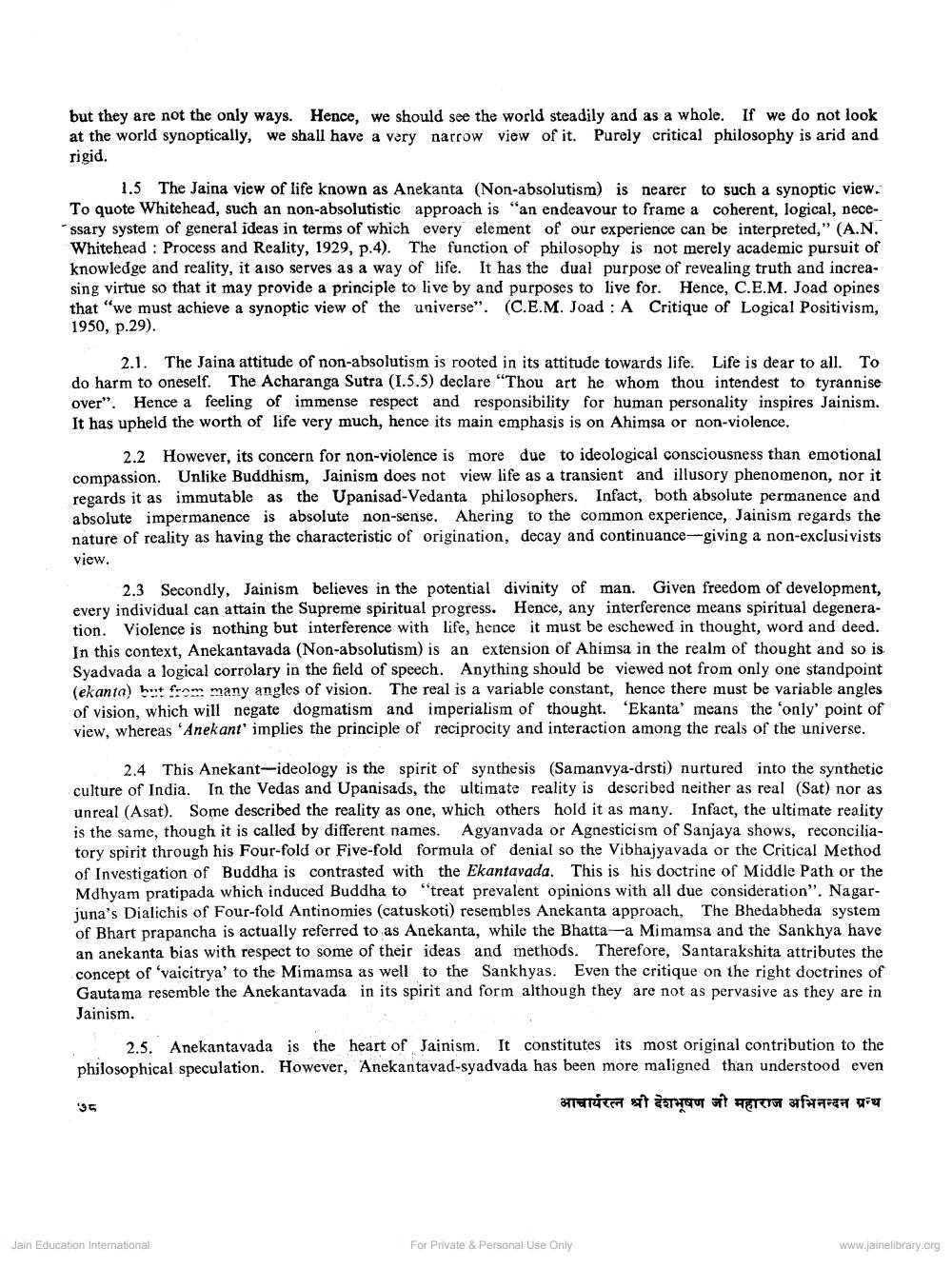________________
but they are not the only ways. Hence, we should see the world steadily and as a whole. If we do not look at the world synoptically, we shall have a very narrow view of it. Purely critical philosophy is arid and rigid.
1.5 The Jaina view of life known as Anekanta (Non-absolutism) is nearer to such a synoptic view. To quote Whitehead, such an non-absolutistic approach is "an endeavour to frame a coherent, logical, necessary system of general ideas in terms of which every element of our experience can be interpreted," (A.N. Whitehead : Process and Reality, 1929, p.4). The function of philosophy is not merely academic pursuit of knowledge and reality, it also serves as a way of life. It has the dual purpose of revealing truth and increasing virtue so that it may provide a principle to live by and purposes to live for. Hence, C.E.M. Joad opines that "we must achieve a synoptic view of the universe". (C.E.M. Joad : A Critique of Logical Positivism, 1950, p.29)
2.1. The Jaina attitude of non-absolutism is rooted in its attitude towards life. Life is dear to all. To do harm to oneself. The Acharanga Sutra (1.5.5) declare "Thou art he whom thou intendest to tyrannise over". Hence a feeling of immense respect and responsibility for human personality inspires Jainism. It has upheld the worth of life very much, hence its main emphasis is on Ahimsa or non-violence.
2.2 However, its concern for non-violence is more due to ideological consciousness than emotional compassion. Unlike Buddhism, Jainism does not view life as a transient and illusory phenomenon, nor it regards it as immutable as the Upanisad-Vedanta philosophers. Infact, both absolute permanence and absolute impermanence is absolute non-sense. Ahering to the common experience, Jainism regards the nature of reality as having the characteristic of origination, decay and continuance--giving a non-exclusivists view.
2.3 Secondly, Jainism believes in the potential divinity of man. Given freedom of development, every individual can attain the Supreme spiritual progress. Hence, any interference means spiritual degeneration. Violence is nothing but interference with life, hence it must be eschewed in thought, word and deed. In this context, Anekantavada (Non-absolutism) is an extension of Ahimsa in the realm of thought and so is Syadvada a logical corrolary in the field of speech. Anything should be viewed not from only one standpoint (ekanta) but from many angles of vision. The real is a variable constant, hence there must be variable angles of vision, which will negate dogmatism and imperialism of thought. 'Ekanta means the 'only' point of view, whereas Anekant' implies the principle of reciprocity and interaction among the reals of the universe.
2.4 This Anekant-ideology is the spirit of synthesis (Samanvya-drsti) nurtured into the synthetic culture of India. In the Vedas and Upanisads, the ultimate reality is described neither as real (Sat) nor as unreal (Asat). Some described the reality as one, which others hold it as many. Infact, the ultimate reality is the same, though it is called by different names. Agyanvada or Agnesticism of Sanjaya shows, reconciliatory spirit through his Four-fold or Five-fold formula of denial so the Vibhajyavada or the Critical Method of Investigation of Buddha is contrasted with the Ekantavada. This is his doctrine of Middle Path or the Mdhyam pratipada which induced Buddha to "treat prevalent opinions with all due consideration". Nagarjuna's Dialichis of Four-fold Antinomies (catuskoti) resembles Anekanta approach, The Bhedabheda system of Bhart prapancha is actually referred to as Anekanta, while the Bhatta-a Mimamsa and the Sankhya have an anekanta bias with respect to some of their ideas and methods. Therefore, Santarakshita attributes the concept of 'vaicitrya' to the Mimamsa as well to the Sankhyas. Even the critique on the right doctrines of Gautama resemble the Anekantavada in its spirit and form although they are not as pervasive as they are in Jainism.
2.5. Anekantavada is the heart of Jainism. It constitutes its most original contribution to the philosophical speculation. However, Anekantavad-syadvada has been more maligned than understood even
आचार्यरत्न श्री देशभूषण जी महाराज अभिनन्दन ग्रन्थ
Jain Education International
For Private & Personal Use Only
www.jainelibrary.org




